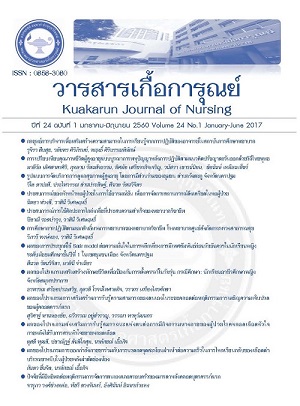ผลของโปรแกรมส่งเสริมการรับรู้สมรรถนะแห่งตนต่อการมีกิจกรรมทางกาย ของผู้ป่วยโรคหลอดเลือดหัวใจภายหลังได้รับการสวนหัวใจขยายหลอดเลือด* The Effect of Perceived Self Efficacy Promoting Program on Physical Activity among Coronary Artery Disease Patient after...
คำสำคัญ:
Physical activity, Self-efficacy, Coronary artery disease, Percutaneous coronary interventionบทคัดย่อ
การวิจัยครั้งนี้เป็นการวิจัยแบบกึ่งทดลอง มีวัตถุประสงค์เพื่อศึกษาผลของโปรแกรมส่งเสริมการรับรู้สมรรถนะแห่งตนต่อการมีกิจกรรมทางกายของผู้ป่วยโรคหลอดเลือดหัวใจภายหลัง ได้รับการสวนหัวใจขยายหลอดเลือด กลุ่มตัวอย่างคือ ผู้ป่วยโรคหลอดเลือดหัวใจภายหลังได้รับการสวนหัวใจขยายหลอดเลือดที่เข้ารับการรักษาในแผนกผู้ป่วยนอก โรงพยาบาลเวชการุณย์รัศมิ์ กรุงเทพมหานคร คัดเลือกกลุ่มตัวอย่างแบบเจาะจงตามคุณสมบัติ แบ่งเป็น กลุ่มควบคุม 22 คนและกลุ่มทดลอง 22 คน จับคู่ให้กลุ่มตัวอย่างมีความคล้ายคลึงกันในเรื่องอายุและเพศ โดยกลุ่มทดลองจะได้รับโปรแกรมส่งเสริมการรับรู้สมรรถนะแห่งตนร่วมกับการพยาบาลตามปกติ เป็นเวลา 8 สัปดาห์ และกลุ่มควบคุมจะได้รับการพยาบาลตามปกติ เครื่องมือเก็บรวบรวมข้อมูล ประกอบด้วย แบบสอบถามข้อมูลส่วนบุคคล แบบสัมภาษณ์การเคลื่อนไหวออกแรง แบบประเมิน ความเชื่อมั่นของตนเองในการเคลื่อนไหวออกแรง ซึ่งผ่านการตรวจสอบความตรงตามเนื้อหา จากผู้ทรงคุณวุฒิ 5 คน โดยมีค่าความเที่ยงสัมประสิทธิ์อัลฟาของครอนบาคเท่ากับ .81 ค่าความตรงตามเนื้อหาเท่ากับ 1 วิเคราะห์ข้อมูลโดยใช้สถิติร้อยละ ค่าเฉลี่ย ส่วนเบี่ยงเบนมาตรฐาน สถิติทดสอบค่าที
ผลการวิจัยสรุปได้ดังนี้
1. การมีกิจกรรมทางกายของผู้ป่วยโรคหลอดเลือดหัวใจภายหลังได้รับการสวนหัวใจขยายหลอดเลือดหลังได้รับโปรแกรมส่งเสริมการรับรู้สมรรถนะแห่งตนสูงกว่าก่อนได้รับโปรแกรมอย่างมีนัยสำคัญทางสถิติ (p<.05)
2. การมีกิจกรรมทางกายของผู้ป่วยโรคหลอดเลือดหัวใจภายหลังได้รับการสวนหัวใจขยายหลอดเลือดกลุ่มที่ได้รับโปรแกรมส่งเสริมการรับรู้สมรรถนะแห่งตนสูงกว่ากลุ่มที่ได้รับการพยาบาลตามปกติอย่างมีนัยสำคัญทางสถิติ (p<.05)
The purpose of this quasi experimental research was to examine the effect of perceived self -efficacy program on physical activity among patients with coronary artery disease after receiving percutaneous coronary intervention. Potential participants were recruited from the out-patient unit, Wetchakarunrasm Hospital, Bangkok. They were assigned to experimental (n= 22) and control groups (n= 22) and matched pairs with age and gender. The experimental group received the perceived self-efficacy program for eight weeks, while the control group received a usual nursing care. The instruments were composed of demographic information, international physical activity questionnaire, and self-efficacy for physical activity scale (Cronbach’s alpha = .81). Descriptive analyses (e.g., percent, mean, and standard deviation) and independent t-test were used to analyze data.
The major findings were as follows:
1. After receiving the self-efficacy program, the mean score of physical activity among patients with coronary artery disease after receiving percutaneous coronary intervention was significantly higher than that before receiving the program. (p<.05)
2. After participating in perceived self-efficacy program, in the experimental group, the mean score of physical activity among patients with coronary artery disease after receiving percutaneous coronary intervention was significantly higher than that in the control group. (p<.05)

















